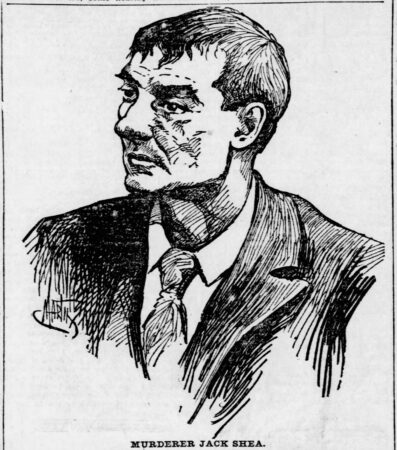Jack Shea Finally Does Time
En agosto 11, 1896, a train arrived in St. Louis, Missouri around 7:30 a.m. Three figures exited the train. Two healthy looking police officers were escorting John D. “Jack” Shea, who killed St. Louis Police Officer Patrick Doran on November 7, 1881.
The gaunt and sickly Shea was no longer the young thug, who executed Doran during a chase after his second escape from the St. Louis Jail. Shea was only 38 years old but 15 years on the run and a couple of stints in prison clearly left their mark on him.

Artist rendering of Jack Shea from the August 11, 1896 St. Louis Post-Dispatch (Dominio Público)
When the officers escorted the pale Shea in to see St. Louis Police Chief Harrigan, Shea told Harrigan, “Bien, Chief, I’ve been playing a losing game. Now I’m soaked for 50 año.” Shea escaped the St. Louis Jail four times. It was during his second escape that he killed Officer Doran.
In October 1881, Shea and his close confederate Frank Fone broke out of the St. Louis Jail for the first time. Committing a series of thefts and burglaries, St. Louis Police captured them in early November 1881.
En noviembre 7, 1881, they escaped again and shot Officer Patrick Doran during a pursuit through Downtown St. Louis. St. Louis Police captured Shea and returned him to jail.
Within a month, Shea and Fone again escaped the St. Louis Jail. While Shea was dangerous, Fone was crafty and planned the escapes. Shea avoided arrest until 1887, when police captured Shea and brought him back to St. Louis.
Authorities closely guarded him for the four years he was in St. Louis Jail. Tried twice for killing Officer Patrick Doran, the court sentenced Shea to hang in the first trial. Sin embargo, Shea successfully appealed. His second trial ended in a sentence of 50 año.
En octubre 2, 1891, an unknown person left an iron gate at the jail open and ten hardened criminals, including Shea, made their escape. Authorities believe the criminals bribed a guard to leave the door open. For the next five years, Shea bounced in and out of prisons in Pennsylvania and Ohio under his alias John Sullivan.
Shea might have continued to elude capture, but a former confederate named Conroy arrived in the Ohio penitentiary near the end of Shea’s sentence for burglary. Conroy told prison authorities who they really had. Prison authorities sent a telegram to St. Louis.
Detectives Jim Tracey and Denny Viehle arrived and took Shea back to St. Louis. Before they arrived and despite his weakened condition, Shea found an opportunity to stab Conroy in the side. Guards stopped him before he could kill Conroy, which Shea admitted was his intent.
Tracey and Viehle took no chances with Shea. They kept him in handcuffs even when he was eating. When they had to stop over in a town between Ohio and Missouri, they locked Shea in the local jail until it was time for the train to leave.
Tracey and Viehle were wise to take their precautions. While his life on the run weakened Shea, Shea constantly thought about escaping. When a St. Louis Post-Dispatch reporter asked him if he would rather the state execute him than serve a 50 year-term, Shea responded, “Why, of course not. Haven’t I got a chance to escape from there?”
Prison officials transported Shea to the Missouri Penitentiary. Between April 1905 and May 1907, officials transferred Shea to the Fulton Asylum. Governor Major commuted the rest of Shea’s sentence on July 3, 1914. Shea would have been about 56 years of age.
You can leave a comment or ask a question about this or any post on my La página de Facebook.
Sources: El St. Louis Post-Dispatch, Agosto 11, 1896, edition, p. 3 and Missouri State Penitentiary Records
Pin It

